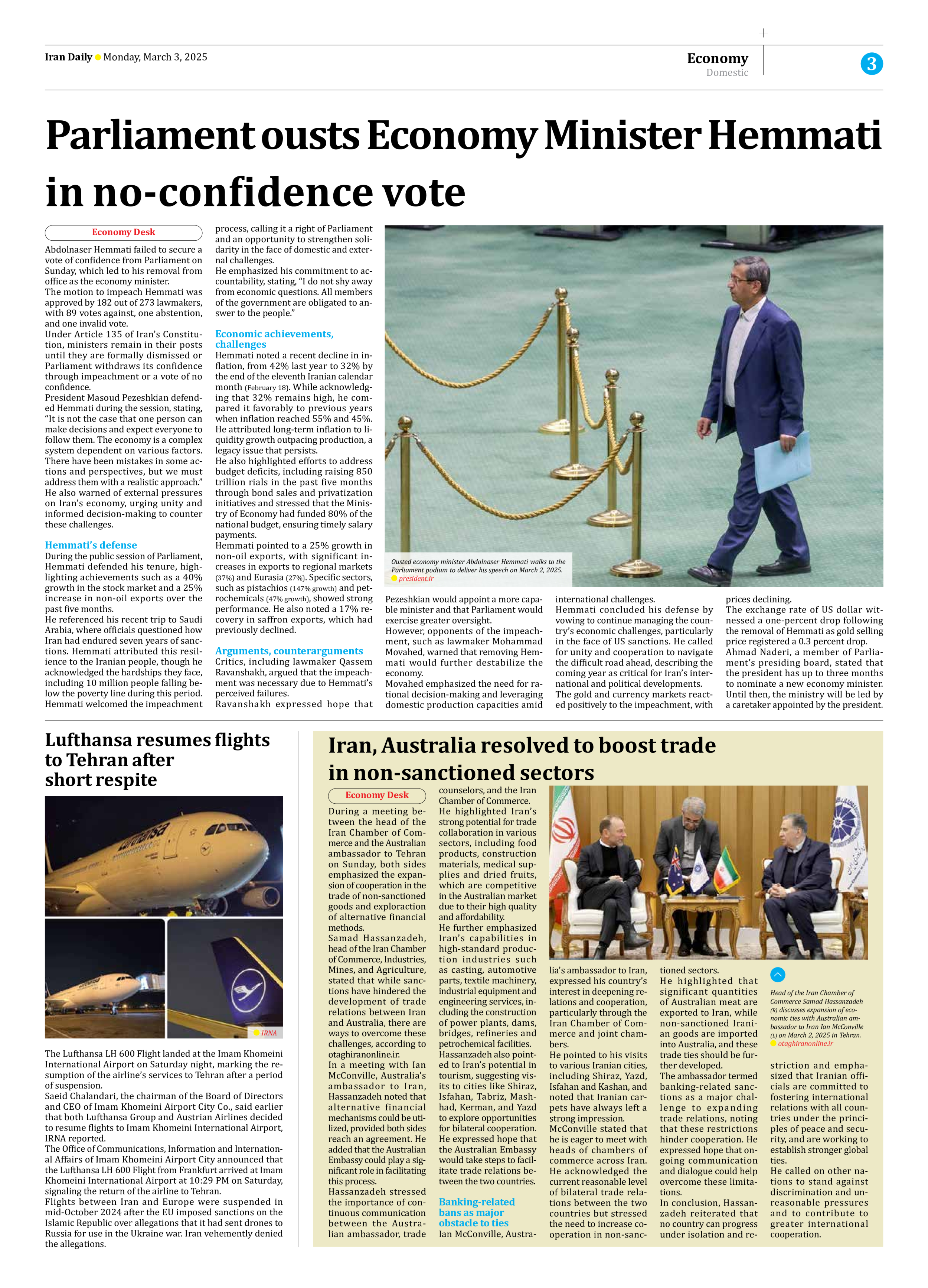
Parliament ousts Economy Minister Hemmati in no-confidence vote
Abdolnaser Hemmati failed to secure a vote of confidence from Parliament on Sunday, which led to his removal from office as the economy minister.
The motion to impeach Hemmati was approved by 182 out of 273 lawmakers, with 89 votes against, one abstention, and one invalid vote.
Under Article 135 of Iran’s Constitution, ministers remain in their posts until they are formally dismissed or Parliament withdraws its confidence through impeachment or a vote of no confidence.
President Masoud Pezeshkian defended Hemmati during the session, stating, “It is not the case that one person can make decisions and expect everyone to follow them. The economy is a complex system dependent on various factors. There have been mistakes in some actions and perspectives, but we must address them with a realistic approach.”
He also warned of external pressures on Iran’s economy, urging unity and informed decision-making to counter these challenges.
Hemmati’s defense
During the public session of Parliament, Hemmati defended his tenure, highlighting achievements such as a 40% growth in the stock market and a 25% increase in non-oil exports over the past five months.
He referenced his recent trip to Saudi Arabia, where officials questioned how Iran had endured seven years of sanctions. Hemmati attributed this resilience to the Iranian people, though he acknowledged the hardships they face, including 10 million people falling below the poverty line during this period.
Hemmati welcomed the impeachment process, calling it a right of Parliament and an opportunity to strengthen solidarity in the face of domestic and external challenges.
He emphasized his commitment to accountability, stating, “I do not shy away from economic questions. All members of the government are obligated to answer to the people.”
Economic achievements, challenges
Hemmati noted a recent decline in inflation, from 42% last year to 32% by the end of the eleventh Iranian calendar month (February 18). While acknowledging that 32% remains high, he compared it favorably to previous years when inflation reached 55% and 45%. He attributed long-term inflation to liquidity growth outpacing production, a legacy issue that persists.
He also highlighted efforts to address budget deficits, including raising 850 trillion rials in the past five months through bond sales and privatization initiatives and stressed that the Ministry of Economy had funded 80% of the national budget, ensuring timely salary payments.
Hemmati pointed to a 25% growth in non-oil exports, with significant increases in exports to regional markets (37%) and Eurasia (27%). Specific sectors, such as pistachios (147% growth) and petrochemicals (47% growth), showed strong performance. He also noted a 17% recovery in saffron exports, which had previously declined.
Arguments, counterarguments
Critics, including lawmaker Qassem Ravanshakh, argued that the impeachment was necessary due to Hemmati’s perceived failures.
Ravanshakh expressed hope that Pezeshkian would appoint a more capable minister and that Parliament would exercise greater oversight.
However, opponents of the impeachment, such as lawmaker Mohammad Movahed, warned that removing Hemmati would further destabilize the economy.
Movahed emphasized the need for rational decision-making and leveraging domestic production capacities amid international challenges.
Hemmati concluded his defense by vowing to continue managing the country’s economic challenges, particularly in the face of US sanctions. He called for unity and cooperation to navigate the difficult road ahead, describing the coming year as critical for Iran’s international and political developments.
The gold and currency markets reacted positively to the impeachment, with prices declining.
The exchange rate of US dollar witnessed a one-percent drop following the removal of Hemmati as gold selling price registered a 0.3 percent drop.
Ahmad Naderi, a member of Parliament’s presiding board, stated that the president has up to three months to nominate a new economy minister. Until then, the ministry will be led by a caretaker appointed by the president.







